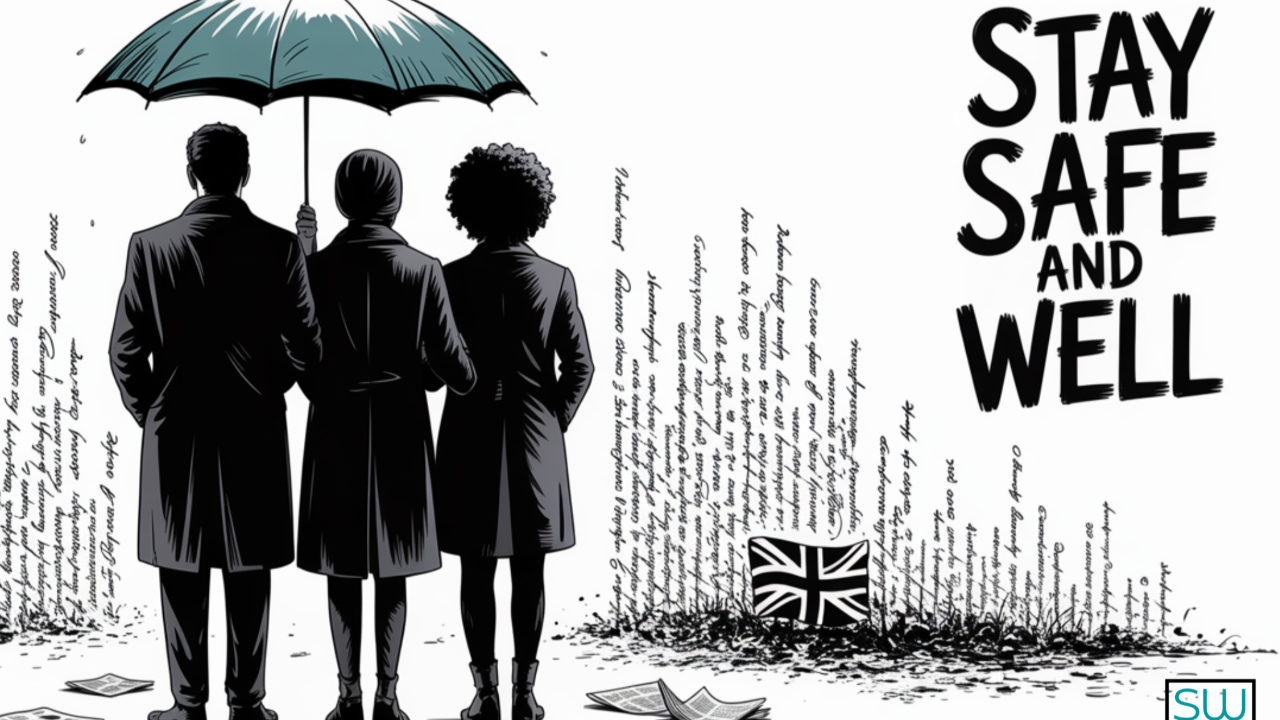Stay Safe and Well – A Guide for Racially Marginalised People
Sep 14, 2025
Let me get straight to it. With the recent raising of the flags, hotel protests, far-right marches, and the unthinkable but unfortunately very real rape of a Sikh woman in Oldbury, West Midlands, as a racially marginalised person in the UK, you may be scared for yourself and your family. I’m not going to sugar-coat it; these are unprecedented times (at least in my almost 50 years of being a British-born Jamaican of African heritage). To tell you not to worry, I know, perhaps would be futile.
However, as someone who educates people and organisations about racism daily and therefore has had to deal with it head-on quite often, I have wisdom to share that may help you rationalise the state of affairs and keep you and your loved ones safe.
My recommendation is that you read these points, take what you need, and share this blog with others. When we are fearful, we can forget the most basic self-care strategies to help us stay safe and well. However, please note that no amount of planning and thinking can prevent a racist or sexual attack. If you are the unfortunate recipient of such, please never blame yourself. At the end of this blog, I have included a range of organisations where you can seek support.
Let’s get into this.
Wellbeing Strategies
It’s quite easy to get caught up in our feelings during times like these. Of course, you are human, seeing or experiencing injustice is often anxiety-fuelling, terrifying, or angering. However, we have to be mindful of our well-being. When our brain detects a threat, our blood rushes to our limbic system (our emotional centre) and away from our prefrontal cortex (the thinking part of our brain). This often leads to poor choices, which can at best leave you feeling stressed and at worst put you in harm’s way.
If, for instance, you see lots of Union Jack flags on your daily commute and they serve as a reminder that people who look like you are not welcome here, let’s work on a way of reframing that. These thoughts can lead you to be hypervigilant during your day, paranoid, and generally moody. On a long-term basis, this racial wear and tear can lead to physical illness. We want to try and avoid this at all costs.
Motivational coach Tony Robbins said that if you don’t like something, change your perception or change your procedure. In a situation like this, changing your perception could mean that instead of focusing on the flags, you look at all the houses and areas where there are no flags and remind yourself that most people are good and don’t support the actions of the far right. Recall the messages you have seen on social media from white people who opposed these types of actions, and comfort yourself with the knowledge that many people reject the demonisation of anyone who doesn’t look white.
Changing your procedure might simply look like taking an alternative route to avoid seeing them.

The following is a quick reference list of ways you can take care of your well-being. Pick one or two that work for you and commit to doing them regularly:
- Tap into your spiritual or religious practices or network.
- Meditate and be mindful.
- Speak with friends and family to make sense of this.
- Keep an eye on the news but know when to switch it off. Watching it too often can add undue stress.
- Move your body! It is amazing what movement can do for your mental health. Dance, take a fitness class, go for a safe walk with friends, or stretch.
- Avoid toxic conversations, whether in person or online. Overexposure is unhealthy. Protect your peace.
- Write or be creative. Writing down your thoughts, drawing, or using another creative outlet can help process emotions and regain a sense of control. For me, even writing this piece is therapeutic.
- Go see a therapist (if you are able). Therapy helps us to reorder our thoughts in a helpful, self-soothing manner. Some therapy services are available for free. See the support section at the end of this blog.
- Connect with a community activist group. Joining a safe group that is advocating for change can help to empower you as you actively work towards achieving justice collectively.
- Practise grounding techniques that help to calm your nervous system. Simple practices like deep breathing or holding a comforting object can ease anxiety in the moment.
- Educate yourself on racism, so you have the language and concepts clear when needing to advocate for yourself at work or in public buildings. We have lots of free resources on our blog and podcast.
- Take care of the basics. Eat well-balanced meals, try to get a full night’s sleep, and stay hydrated. Taking care of the basics can make a huge difference when you are feeling overwhelmed.
Last year, after the summer riots outside migrant hotels, I wrote in more detail about these strategies and also shared book recommendations; you can read that here.
Stay Physically Safe
Many of us are very adept at standing up for ourselves in the face of racism and standing our ground, and very rightly so (in most instances). However, it is not always wise to do so. Sometimes, by angering the person who is the aggressor, this can lead to them becoming violent. Therefore, always think before getting into an argument with someone who is being racist, especially if you are vulnerable.
This is especially important if you are out in public, away from the protection of workplace policies. In heightened situations, ask yourself: is it more important that I put this person in their place, or is it more important that I arrive home safely? Often, our egos can land us in tricky situations.
Again, this is not to say don’t ever speak up for yourself; this, of course, is often very important. It is just to remind you that when you are vulnerable , for example, if you are alone, outnumbered, physically disabled, smaller than the aggressor, suspect the person has a serious mental health issue, or if you are a woman, it’s important to be sensible.
Women and Girls
As a woman or young girl, we have to be particularly careful. We can be seen as easy targets. However, I must repeat that the fault of physical attacks (sexual or otherwise) always lies with the perpetrator. You are never responsible for their act, and unfortunately, no amount of pre-planning can 100% protect you. However, there are some actions you can take to reduce the possibility:
- Download a tracking app like Life360 (the basic version is free), and make sure you connect with your family, so someone knows where you are at all times.
- Where possible, always walk with others. If you have to walk alone, find routes that are well-lit and highly populated.
- Trust your instincts. If something doesn’t feel right, cross the road, walk towards a busier place, or seek out a shop or business.
- Carry a safety alarm and put it in a place where it is easily accessible, like a pocket or shoulder bag.
- Use licensed taxis only and sit near the driver or other passengers on buses and trains. Share your journey details (e.g., Uber’s “share trip” feature).
- Keep your phone charged and accessible (not at the bottom of your bag). Save emergency contacts and know how to quickly call 999.
- If you’re being harassed, use a well-known bystander strategy. Make eye contact with another person nearby and ask, “Can you stay with me?” This can help to diffuse any danger.
- Consider taking a women’s self-defence class. This will help you to build confidence and give options if the worst should happen.
I hate that I am even writing this piece, but we are in times where being a little more mindful and prepared can help us navigate these difficult times.
Most Importantly!
What I know to be true in this work and life in general is that many people thrive off the misery of others. Have you heard of the German word “schadenfreude”? In Jamaican culture, we call this “Bad mine” (i.e. bad mind). It means gaining pleasure from someone else’s pain, downfall, or misfortune.
Don’t fall prey to this! As African American poet Toi Derricotte says, “Joy is a form of resistance.” I honestly believe the most effective thing you can do to feel better overall, not just in situations like these, is to enjoy your life to the fullest. Have fun, dance, sing, paint, be around people who make you feel happy and safe, indulge in your wildest dreams, go for your goals, and make yourself happy!
Before leaving you with a list of support organisations, I will leave you with a few quotes to help you embody this message:
“Caring for myself is not self-indulgence, it is self-preservation, and that is an act of political warfare.” Audre Lorde
To be truly visionary, we have to root our imagination in our concrete reality while simultaneously imagining possibilities beyond that reality.” Bell Hooks
“If you want others to be happy, practise compassion. If you want to be happy, practise compassion.” Dalai Lama
Specialist Helplines and Websites
- Rape Crisis England & Wales: 0808 802 9999. Support for people who have suffered from sexual assaults (recent and historical)
- Sikh Helpline - 0845 644 0704/ 07999 004363. Confidential support for Sikh people.
- Victim Support: 0808 1689 111. Help for people who have been victims of crimes.
- Muslim Women’s Network Helpline: 0800 999 5786
- Black Minds Matter UK – free culturally appropriate talking therapy for black people in the UK
- Jewish Listening Line: 0208 922 2222 A general support line for people of Jewish heritage.
- Stop Hate UK – Supporting victims of hate crimes
- On Your Side - for UK-based East or Southeast Asian individuals who have faced racism
- Refugee Action: Help and advice for asylum seekers and refugees.
- Galop: 0800 999 5428. The UK’s LGBT+ anti-abuse charity
- In the UK, always dial 999 if you feel in immediate danger.
- For non-emergencies, use 101 or online hate crime/assault reporting portals.
There will be many organisations that are missing from this list. If you feel strongly that an organisation needs to be included, email us and we will add it.
If you're a leader of an organisation with a need to educate staff on how to be more inclusive and culturally humble and protect your company, book an appointment here to discuss options.
Talking about racism can seem difficult and uncomfortable. This CPD accredited course provides a foundational education on racism to help to increase racial literacy which includes building confidence to speak about and deal with issues concerning race. It provides a language through which meaningful conversation can take place (particularly in the workplace).
Stay connected with news and updates!
Join our mailing list to receive the latest news and updates from our team.
Don't worry, your information will not be shared.
We hate SPAM. We will never sell your information, for any reason.
